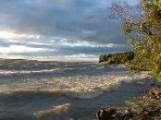Cottagers, get ready for a smelly summer
|
OTTAWA (CP) - Frank Borgatti still remembers a time he didn't have to wear shoes to go swimming. The longtime cottager recalls the days he used to spend with his two kids, playing barefoot in the shallow waters of their property on Kempenfelt Bay on Lake Simcoe, Ont. Then the zebra mussels moved in and going into the water without shoes became a dangerous affair. "Since zebra mussels arrived, you can no longer walk in the water like you used to," Borgatti laments. "Now you have to wear shoes. It's virtually impossible to avoid them." The razor-sharp mollusks, with a propensity to stick to boats, docks and just about everything else, have already inflicted plenty of damage on unprotected feet and water-intake pipes. But things may be about to get much worse. Cottagers, get ready for a smelly summer. A new study says zebra mussels may be changing the chemistry of lake water in Canada, spurring the growth of potentially toxic - and smelly - bacteria. Masses of cyanobacteria, also known as blue-green algae, are becoming more common in Canadian lakes because of the mussels. Some species of cyanobacteria secrete chemicals that alter the taste of drinking water and create a foul odour. Others emit toxins that can be potentially harmful to humans. The bacteria bloomed in the 1960s and '70s, nourished by lake water polluted by phosphorus, a chemical component of household detergents. But cyanobacteria in Canadian lakes declined after phosphorous was banned from detergents 30 years ago. "However, over the last decade, we're starting to see cyanobacteria re-emerging, and we believe it's due to zebra mussels altering the lakes' water chemistry," says Andrew Laursen, co-author of the study and a professor of chemistry and biology at Ryerson University in Toronto. The study, published in a recent issue of the journal Science of the Total Environment, found that zebra mussels are picky eaters - they don't care for blue-green algae. The mussels collect the algae in mucous that they release back into the water. Nitrogen converts to gas when the mucous begins to break down, and phosphorous is left over. This might make the water crystal clear, but it's wreaking havoc with ecosystems. "A high phosphorous-to-nitrogen ratio favours cyanobacteria growth and, with zebra mussels in the water, all of a sudden we've started seeing it again," Laursen says. It's hard to predict which lakes will be affected because cyanobacteria growth can loom up literally overnight. "You might look at a lake and see nothing day after day and then all of a sudden, bam, it's green and smells," says Laursen. "It's almost instantaneous because cyanobacteria reproduce and divide exponentially." Laursen's research team simulated the ecosystem of lakes by constructing water columns, some with zebra mussels and others without. Oxygenated water containing food for the zebra mussels was pumped from the bottom to the top of each column. The researchers found the ratio of phosphorus to nitrogen went up when mussels were present, creating favourable conditions for toxic cyanobacteria to grow. Zebra mussels were first discovered in 1988 in Lake St. Clair, near Detroit. It is believed the tiny mollusks were brought to North America from eastern Europe in the ballast water of transatlantic ships. Since their discovery, zebra mussels have rapidly spread through the Great Lakes, the Mississippi River system, and many inland lakes in southern Ontario and Quebec. Frank Borgatti and his family are just some of the thousands of unlucky victims of the zebra mussel invasion. And now he's worried that an outbreak of cyanobacteria could lower property values. "If people become aware of this problem, they might not be inclined to purchase lakefront property," Borgatti says. "All of a sudden the benefits of the lake that we had growing up aren't available to our kids or grandchildren." Zebra mussels have clogged Borgatti's lakewater intake pipe several times, and he says he cuts himself on the razor-sharp pests everytime he goes in the water. "You can't avoid them no matter what you do. You can't eradicate them," he says. "It's like a plague." Laursen says cottagers can take steps to cut down on the risk of cyanobacteria developing in lakes by curbing their use of certain dishwashing detergents that still contain phosphorous, and making sure septic systems are efficient. But zebra mussels aren't going anywhere, he adds. "We've reached a point where we've learned to deal with zebra mussels as a reality. They're here to stay." |




0 Comments:
Post a Comment
<< Home